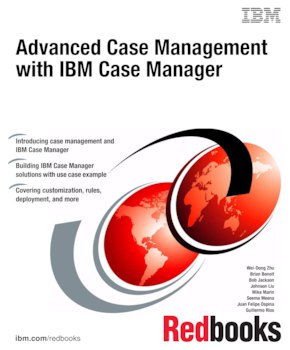
Published on 02 June 2014, updated 28 April 2015
Read in Google Books Order hardcopy
Share this page:
ISBN-10: 0738439290
ISBN-13: 9780738439297
IBM Form #: SG24-7929-03
Authors: Wei-Dong Zhu, Brian Benoit, Bob Jackson, Johnson Liu, Mike Marin, Seema Meena, Juan Felipe Ospina and Guillermo Rios
Abstract
Organizations face case management challenges that require insight, responsiveness, and collaboration. IBM® Case Manager, Version 5.2, is an advanced case management product that unites information, process, and people to provide the 360-degree view of case information and achieve optimized outcomes. With IBM Case Manager, knowledge workers can extract critical case information through integrated business rules, collaboration, and analytics. This easy access to information enhances decision-making ability and leads to more successful case outcomes. IBM Case Manager also helps capture industry preferred practices in frameworks and templates to empower business users and accelerate return on investment.
This IBM Redbooks® publication introduces the case management concept. It includes the reason for and benefits of case management, and why it is different from the traditional business process management or content management. In addition, this book addresses how you can design and build a case management solution with IBM Case Manager and integrate that solution with external products and components.
This book is intended to provide IT architects and IT specialists with the high-level concepts of case management and the capabilities of IBM Case Manager. It also serves as a practical guide for IT professionals who are responsible for designing, building, customizing, and deploying IBM Case Manager solutions.
Table of Contents
Part 1. Concept and overview
Chapter 1. Case management concept
Chapter 2. Typical case management applications
Chapter 3. IBM Case Manager overview
Chapter 4. Inner workings of IBM Case Manager
Part 2. Solution development
Chapter 5. IBM Case Manager tools
Chapter 6. Designing case management solutions
Chapter 7. Building a simple solution: Part 1
Chapter 8. Building a simple solution: Part 2
Chapter 9. Migrating and deploying solutions
Part 3. Solution customization and advanced topics
Chapter 10. User interface and widgets
Chapter 11. Customization topics
Chapter 12. Advanced solution topics
Chapter 13. Business rules
Chapter 14. Integration points
Appendix A. Additional material